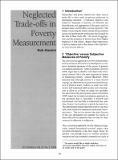| dc.contributor.author | Baulch, Bob | en |
| dc.date.accessioned | 2016-02-24T16:00:41Z | |
| dc.date.available | 2016-02-24T16:00:41Z | |
| dc.date.issued | 01/01/1996 | en |
| dc.identifier.citation | Baulch, B. (1996) Neglected Trade?offs in Poverty Measurement. IDS Bulletin 27(1): 36-42 | en |
| dc.identifier.issn | 1759-5436 | en |
| dc.identifier.uri | https://opendocs.ids.ac.uk/opendocs/handle/20.500.12413/9254 | |
| dc.description.abstract | Summaries Discussions of the conventional income/consumption and participatory approaches to poverty measurement have focused on the trade?off between ‘objective’ and subjective measures of poverty. The trade?offs between the identification and aggregation of the poor and between static and dynamic measurement have been neglected. Although, the income/consumption approach may sometimes misidentify the poor, its well understood aggregation properties make it extremely useful for regional and national level policy making. In contrast, participatory methods are most valuable for identifying the other, more subjective, dimensions of poverty at the project or village level. In order to be able to distinguish between chronic and transitory poverty, both approaches need to pay more attention to dynamic issues and the ability to track the poverty status of households and individuals over time. | en |
| dc.format.extent | 7 | en |
| dc.publisher | Institute of Development Studies | en |
| dc.relation.ispartofseries | IDS Bulletin Vol. 27 Nos. 1 | en |
| dc.rights.uri | http://www.ids.ac.uk/files/dmfile/IDSOpenDocsStandardTermsOfUse.pdf | en |
| dc.title | Neglected Trade?offs in Poverty Measurement | en |
| dc.type | Article | en |
| dc.rights.holder | © 1996 Institue of Development Studies | en |
| dc.identifier.doi | 10.1111/j.1759-5436.1996.mp27001004.x | en |

